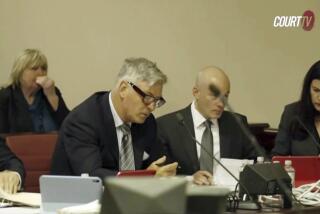Ito Releases Hardship Cases From Jury Pool : Simpson case: Remainder are ordered to complete 75-page questionnaires.
- Share via
In a brief, perfunctory session with the final group of prospective jurors in the O.J. Simpson murder case, Superior Court Judge Lance A. Ito on Thursday dismissed all those who gave any indication that they might have difficulty serving for a long trial and directed the rest to fill out detailed questionnaires.
A few of the 53 potential jurors who were screened Thursday had previously indicated their willingness to serve, but did not show up as scheduled. In addition, one woman who had said she could endure the hardship of a trial that might last six months told the judge she had gotten a new job and no longer could take that much time off. She was excused.
In all, the court has now identified 304 Los Angeles County residents who say they have no impediments to serving in the Simpson case. The prospective panelists have completed questionnaires attempting to discern which of them have biases that would make it impossible to impartially weigh the evidence in the Simpson case.
Simpson, a football hero and nationally known actor and commercial spokesman, is charged with the murders of his ex-wife, Nicole Brown Simpson, and her friend Ronald Lyle Goldman, whose bodies were found slashed and stabbed to death June 13. He has pleaded not guilty.
The 75-page questionnaires that prospective jurors have completed are being turned over to the lawyers in batches, and they already have received nearly 100. On Thursday, Simpson attorney Robert L. Shapiro said he had reviewed about 70. He and prosecutors said that both sides are likely to agree that some panelists should be dismissed immediately, but the remainder of the group will be subjected to questioning by Ito and the attorneys beginning Oct. 12.
Ito has other volatile questions to resolve in the coming weeks. Among them is the issue of whether to sequester the jury, a move that would take jurors away from their families and friends for the duration of the trial.
Prosecutors have asked for sequestration, arguing that publicity surrounding the case is so intense that to allow jurors to return home at night during the trial would inevitably cause them to be exposed to influences outside the courtroom. Instead, prosecutors propose putting up the panel in a nearby hotel during the trial--the same technique used in a few other high-profile trials such as that of the four Los Angeles police officers accused of violating Rodney G. King’s civil rights.
But Simpson’s lawyers, in a motion filed Sept. 14 and unsealed Thursday, argued that sequestering a jury would increase the chances of a conviction and impose an unfair burden on the 12 jurors and eight alternates in the case.
“There is a serious danger that the prosecutorial request for a sequestered jury is a tactical choice, to secure a jury the prosecutors believe will be more favorably disposed toward conviction,” Simpson’s attorneys said in their motion. “Indeed, the folklore that a sequestered jury is a convicting jury finds ample historical support.”
Simpson’s lawyers argue that sequestration will limit the jurors who may be able to serve, create potential conflicts among the jurors and place members of the panel so firmly under the control of the government that they are more inclined to convict. They cite a 1968 case in which jurors described being pampered by federal marshals--”We had entertainment, always the best, food always the best, martinis before dinner,” one juror from that case later recalled, according to the defense motion.
At the same time, Simpson’s attorneys worry that a prolonged sequestration may turn jurors against one another and make them angry and restless. “The defense may be facing a jury who are like the proverbial ‘scorpions in a bottle,’ ” according to the motion.
Simpson’s lawyers also objected to keeping the identities of jurors secret--an approach that some experts say makes jurors more willing to convict and can imply that a defendant is a threatening figure.
Ito has not said when he will rule on sequestration but has indicated that he first wants to begin the process of questioning prospective jurors. He has said he is inclined to sequester the jury at least for its deliberations, but has expressed reluctance to extend the period of sequestration.
With the first phase of jury selection moving more smoothly than either side had anticipated, Ito has cleared most of next week to allow the lawyers and their jury consultants to focus on the task of reading and evaluating questionnaires. Only one hearing is scheduled, for Wednesday, at which Ito will attempt to conclude arguments over police searches of Simpson’s home and cars.
The prospect of even a brief respite in the Simpson case prompted some of the scores of reporters who have descended on the Criminal Courts Building to begin trickling home Thursday afternoon--at least for now.
“I’m leaving tomorrow morning first thing,” said Charles Thomas, a television reporter from Chicago, adding that Thursday’s brief hearing left him with little to report. “O.J. didn’t say anything, and a chill ran through me. I thought: ‘What am I going to do?’ ”
More to Read
Sign up for Essential California
The most important California stories and recommendations in your inbox every morning.
You may occasionally receive promotional content from the Los Angeles Times.














